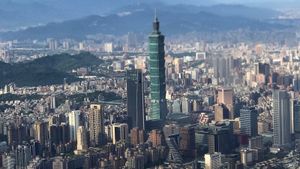The political winds of Bangladesh shifted dramatically when the High Court cleared Tarique Rahman, the acting chairman of the Bangladesh Nationalist Party (BNP), alongside 48 others, of any wrongdoing related to the infamous August 21 grenade attack. This decision marks the culmination of years of legal battles rooted deeply within the turbulent history of Bangladeshi politics.
The August 21, 2004 grenade assault targeted a rally of the Awami League (AL) at Bangabandhu Avenue, resulting in the tragic loss of 24 lives and injuring around 300 others. The attack was widely condemned and led to accusations against prominent BNP leaders, including Tarique Rahman, who was not only viewed as the heir apparent to his mother, former Prime Minister Khaleda Zia, but was exiled during these turbulent years.
The convictions had been handed down by the Speedy Trial Tribunal-1 of Dhaka back on October 10, 2018, where 19 individuals received death sentences, and Rahman was sentenced to life imprisonment. The proceedings surrounding the case were fervently criticized by Rahman’s defenders, who argued they were politically motivated. Many believed the BNP leaders were being used as scapegoats to draw attention away from the ruling AL's failures.
On December 1, 2024, the High Court bench comprising Justices AKM Asaduzzaman and Syed Enayet Hossain deemed the previous judgments unlawful, stating the trial was based on insufficient and improperly gathered evidence. The court noted significant irregularities, especially concerning the introduction of new evidence without compliance with legal protocols. This included reliance on the confessional statements from individuals alleged to have been coerced during their apprehension.
Defense attorney SM Shahjahan was elated by the verdict, claiming, "We have got justice because the charges were not proven in terms of evidence as well as law." He highlighted the absence of eyewitness accounts linking Tarique and others directly to the grenades. It was noted the statements made during earlier investigations were tainted with claims of torture, undermining their credibility.
The aftermath of the verdict ignited celebratory processions across Bangladesh, particularly among BNP supporters. Sweets were distributed, and jubilant gatherings were reported from various districts, including Dhaka, Chattogram, and even remote towns like Jessore and Bogura. Leading BNP figures, including Ruhul Kabir Rizvi and Mirza Abbas, expressed optimism about Rahman’s eventual return to Bangladesh, emphasizing this victory as indicative of the resilience against political oppression.
Rizvi declared at the BNP's Nayapaltan central office, proclaiming, "Justice has been served" and emphasizing how this verdict countered the previous narrative pushed by the Awami League. They claimed the verdict demonstrated the need to end political vendettas within Bangladesh, urging for unity and healing.
Of significant interest is the proposal from Deputy Attorney General Md Jashim Sarker, who indicated the government might challenge the ruling at the Supreme Court’s Appellate Division. While no precise timeline for such actions has emerged, the attorney general’s office is expected to approach the matter cautiously after the full written judgement is disclosed.
Initially, investigations and court proceedings had sowed deep political divides, exacerbated by the bloody uprising and ensuing accusations against both major parties. Leading up to the High Court's ruling, allegations of political expedience by the Awami League were rampant, with many asserting these charges were part of a larger agenda to eliminate political rivals.
While Tarique Rahman's acquittal sparked celebrations among his supporters, reactions from the Awami League were distinctly somber, as they remain steadfastly against the ruling party's historical narrative. They voiced concerns about accountability for past offenses and urged the populace to not forget the severe impact of the attacks.
The next steps for Rahman are anticipated to provoke serious discussions within Bangladeshi politics as he contemplates returning from London. His potential return could significantly reshape the political climate, poised to position the BNP favorably heading toward the next elections.
Understanding the ramifications of this ruling involves recognizing the complex relationships between political power, legal frameworks, and the society of Bangladesh. For many, it highlights the enduring volatility of its political climate and the lengths to which individuals—and entire parties—will go to secure their place within it.
Rahman described the verdict as proof of his innocence, urging his supporters and fellow politicians alike to abandon notions of political vengeance and pursue democracy grounded in fairness, sharing on his social media, “The beauty of truth is it inevitably triumphs over propaganda and conspiracy.” His appeals for unity, tolerance, and the rule of law resonates within the broader narratives of justice sought by populations across the globe.
Overall, the ramifications of the High Court’s decision could be felt broadly, especially as the nation gears up for future electoral tests. With emotions running high among both supporters and opposition, Bangladesh’s political saga continues to evolve.



